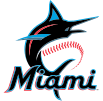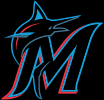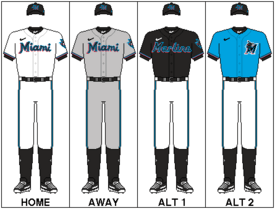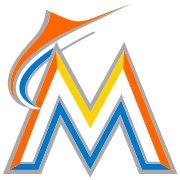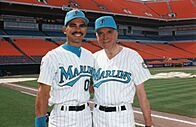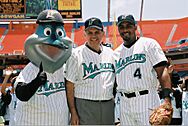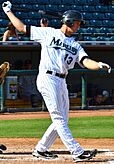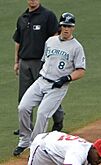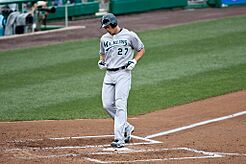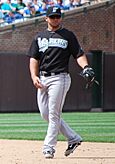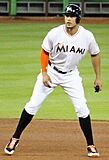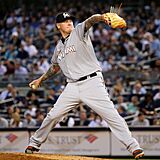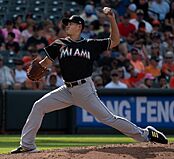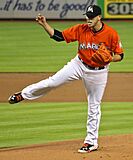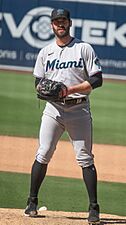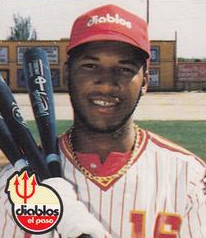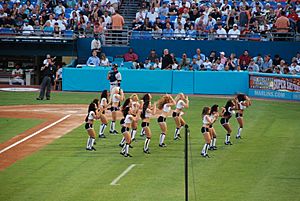Miami Marlins facts for kids
Quick facts for kids Miami Marlins |
|||||
|---|---|---|---|---|---|
|
|||||
|
|||||
| Major league affiliations | |||||
|
|||||
| Current uniform | |||||
| Retired numbers | 42 (Retired by MLB) | ||||
| Colors | |||||
|
|||||
| Name | |||||
|
|||||
| Other nicknames | |||||
|
|||||
| Ballpark | |||||
|
|||||
| Major league titles | |||||
| World Series titles (2) |
|
||||
| NL Pennants (2) |
|
||||
| East Division titles (0) | None | ||||
| Wild card berths (4) |
|
||||
| Front office | |||||
| Principal owner(s) | Bruce Sherman | ||||
| President | Caroline O'Connor (President of Business Operations) | ||||
| President of baseball operations | Peter Bendix | ||||
| General manager | Peter Bendix | ||||
| Manager | Clayton McCullough | ||||
The Miami Marlins are an American professional baseball team based in Miami. The Marlins compete in Major League Baseball (MLB) as a member of the National League (NL) East Division. The club's home is LoanDepot Park.
The franchise began play as an expansion team in the 1993 season as the Florida Marlins. The Marlins originally played home games at Joe Robbie Stadium, which they shared with the Miami Dolphins of the National Football League (NFL). In 2012, the team moved to LoanDepot Park (then known as Marlins Park), their first exclusive home and the first to be designed as a baseball park. As part of an agreement with park owner Miami-Dade County to use the stadium, the franchise also changed their name to the Miami Marlins prior to the 2012 season.
With a record of 2,303–2,709 (.459), the Marlins have the lowest winning percentage and fewest postseason appearances (four) among active MLB franchises. Despite this, the Marlins won the World Series during their first two playoff runs in 1997 and 2003. Only three players were on both World Series teams with the Marlins: Jeff Conine, Luis Castillo, and Rick Helling (both Conine and Castillo are the only Marlins to play a thousand games with the team). All four of their playoff appearances came as wild card teams, making them one of two MLB franchises (along with the Colorado Rockies) to have never won a division title, as well as the only franchise to have never appeared in back-to-back postseasons. The Marlins were also the first team to win the World Series as a wild card. The Marlins have no retired numbers, with the exception of Jackie Robinson's universally retired #42 in 1997.
Contents
History
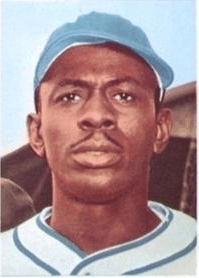
Wayne Huizenga, CEO of Blockbuster Entertainment Corporation, was awarded an expansion franchise in the National League (NL) for a $95 million expansion fee and the team began operations in 1993 as the Florida Marlins. MLB had announced a few months earlier that it intended to add two new teams to the National League. It was a foregone conclusion that one of them would be placed in Florida; the only question was whether Huizenga would beat out competing groups from Orlando and Tampa Bay. Orlando waged a very spirited campaign bolstered by its family-oriented tourism industry. Tampa Bay already had a baseball park—the Florida Suncoast Dome in St. Petersburg, completed in 1990. However, on June 10, 1991, the National League awarded a Miami-based franchise to Huizenga. The franchise adopted the nickname "Marlins" from previous minor league teams, the Miami Marlins of the Triple-A 's International League from 1956 to 1960, and the Miami Marlins (1962–70) and Miami Marlins (1982–88) teams that played in the Florida State League.
The Marlins' first manager was Rene Lachemann, a former catcher who had previously managed the Seattle Mariners and Milwaukee Brewers, and who at the time of his hiring was a third base coach for the Oakland Athletics. The team drafted its initial lineup of players in the 1992 MLB Expansion Draft. The Marlins defeated the Houston Astros 12–8 in their inaugural spring training game. Jeff Conine hit Florida's first homer before a crowd of 6,696 at the Cocoa Expo Sports Complex. The Marlins won their first game on April 5, 1993, against the Dodgers. Charlie Hough was the starting pitcher for that game. Jeff Conine went 4-for-4 as well, making him an immediate crowd favorite. By the end of his tenure with Florida, he had earned the nickname "Mr. Marlin." Gary Sheffield and Bryan Harvey represented the Marlins as the club's first All-Star Game selections, and Sheffield homered in the Marlins' first All-Star Game at-bat. The team finished the year five games ahead of the last-place New York Mets and with an attendance of 3,064,847. In that season, the Marlins traded young set-up reliever Trevor Hoffman and two minor-league prospects to the San Diego Padres for third baseman Gary Sheffield. While Sheffield helped Florida immediately and became an all-star, Hoffman eventually emerged as the best closer in the National League. After the 1993 season, Donald A. Smiley was named the second president in club history. The Marlins finished last (51–64) in their division in the strike-shortened season of 1994 and fourth (67–76) in 1995. Lachemann was replaced as manager midway through the 1996 season by director of player development John Boles.
1997: First World Series title
Following an 80–82 record in 1996, former Pittsburgh Pirates manager Jim Leyland was hired to lead the club heading into 1997.
In 1997, the Marlins finished nine games back of the Division Champion Atlanta Braves, but earned the wild card berth. Veteran additions such as LF Moisés Alou, 3B Bobby Bonilla, and trade-deadline additions Darren Daulton and Jim Eisenreich added experience and clutch hits. Talented young stars Luis Castillo (2B) and Édgar Rentería (SS) comprised one of the best double play combos in the NL. The Marlins swept the San Francisco Giants 3–0 in the National League Division Series, and then went on to beat the Atlanta Braves 4–2 in the National League Championship Series, overcoming the loss of Alex Fernandez to a torn rotator cuff, and Kevin Brown to a virus. Brown's place was taken in Game 5 by rookie pitcher Liván Hernández, who struck out 15 Braves and outdueled multiple Cy Young Award winner Greg Maddux to a 2–1 victory. The underdog Marlins went on to face the Cleveland Indians in the 1997 World Series, and won in seven games. In Game 7, Craig Counsell's sacrifice fly in the bottom of the ninth tied the game at 2, then, with the bases loaded and two outs in the bottom of the 11th, Édgar Rentería's soft liner glanced off the glove of Cleveland pitcher Charles Nagy and into center field to score Counsell and give the Marlins the win.
2003: Second World Series victory
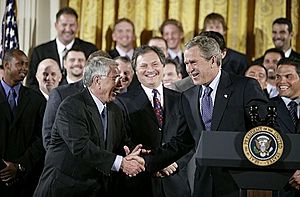
On May 9, the Marlins called up high-kicking southpaw Dontrelle Willis from the Double-A Carolina Mudcats and helped carry the injury-plagued Marlins with an 11–2 record in his first 17 starts. Miguel Cabrera (also from the Mudcats) filled in well, hitting a walk-off home run in his first major league game, against the Tampa Bay Devil Rays at Pro Player Stadium. Both Willis and Cabrera would later prove to be essential parts of the Marlin's playoff success. Jeff Conine – an original Marlin and member of the 1997 World Series team – returned from Baltimore, Hall of Fame catcher Iván Rodríguez signed with the Marlins as a free agent and closer Ugueth Urbina arrived from the Texas Rangers. These acquisitions helped to keep the team in contention, and although they finished ten games behind the Braves, the Marlins captured the NL wild card.
On October 15, the Marlins defeated the Chicago Cubs four games to three in the 2003 National League Championship Series, coming back from a 3–1 deficit. Game 6 saw the Marlins play a role in one of baseball's most infamous moments, the Steve Bartman incident. With one out in the eighth inning and the Cubs three runs ahead, Marlins second baseman Luis Castillo hit a pop foul a row into the stands along the third baseline. Cubs fan Steve Bartman reached for the ball, preventing Cubs left fielder Moisés Alou from making the out and setting off an eight-run Marlins rally. The incident with Bartman and a come-from-behind win in Wrigley Field in Game 7 helped the Marlins capture their second NL pennant, keeping the "Curse of the Billy Goat" alive and well.
In the 2003 World Series, the Marlins defeated the heavily favored New York Yankees in six games, winning the sixth game in Yankee Stadium. Shortstop Álex González helped the Marlins in Game 4 of the series with a walk-off home run in extra innings. Josh Beckett was named the Most Valuable Player for the series after twirling a five-hit complete-game shutout in Game 6. Skipper Jack McKeon became the oldest manager ever to win a World Series title.
2012–present
In 2012, the team moved from the football-oriented Sun Life Stadium (located in Miami Gardens) to Marlins Park in downtown Miami. As a condition of the move, the team was renamed the Miami Marlins, and adopted a new logo and colors. On November 16, 2017, Giancarlo Stanton won the National League MVP, becoming the first Marlin to win the award.
During the 2020 shortened season, the Marlins finished with a 31–29 overall record and 2nd place in the NL East. In the Wild Card Series they swept the Chicago Cubs in 2 games. Miami loss in three games to the Atlanta Braves in the NLDS.
On November 13, 2020, the Marlins became the first club in any American major-level sports league to hire a woman to an executive position when Kim Ng was announced as the team's general manager. In addition, she will also be MLB's first Asian American general manager. On February 28, 2022, it was announced Derek Jeter stepped down as CEO of the Marlins. On September 30, 2023, with the Marlins 7–3 win in Pittsburgh, the Marlins clinched their fourth postseason berth, making Kim Ng the first woman GM in MLB history to lead a playoff team.
Uniform history
1993–2002
The Florida Marlins debuted wearing three different uniforms. The primary and alternate home uniforms shared the same design: "Marlins" (with an underline after the letter "S") in teal with black trim and letters were rendered in black with teal trim, along with teal pinstripes. The alternate home uniforms were sleeveless, and teal undershirts were added to the ensemble. The road uniforms featured "Florida" (with the marlin wrapped around the letter "F") in teal with black trim and letters were rendered in black with teal trim. The primary logo patch was placed on the left sleeve. The Marlins wore three different cap designs, all featuring the "F" insignia in front of a leaping marlin. The all-teal home cap and the black-brimmed teal road cap were initially the primary headwear the team used, with the all-black cap as the alternate.
By the late 1990s, teal was gradually de-emphasized and the Marlins wore black caps and undershirts for the remainder of the uniform's run.
2003–2011
The Marlins introduced new uniforms before its second World Series-winning season. On the home uniforms, teal was relegated to accent color status with black the primary lettering and pinstripe color. Silver accents were also added to the letters. A sleeved alternate pinstriped home uniform replaced the original sleeveless version, sharing the same design as the primary home uniform except with the "F" logo on the left chest. The "F" logo also took its place on the left sleeve in place of the primary logo. Road uniforms again featured "Florida" but shared the same script look and color scheme as the home uniform (with an underline after the letter "A"). White accents were added to the letters. In addition, the Marlins began wearing a black alternate uniform, featuring the same "Marlins" script but in silver with teal, black and white accents. Both alternate uniforms lacked the front chest numbers.
In 2010, the Marlins changed its road uniform design, replacing "Florida" with "Marlins". The sleeve logo patches were also removed.
2012–2018
Rebranding as the Miami Marlins, the team introduced a new color scheme with orange, black and blue. The "M" insignia is white with orange, yellow and sky blue accents, along with a stylized abstract marlin on top. This logo served as a cap logo as well as a patch on the left sleeve. The primary home, road and black alternate uniforms all feature "Miami" in front, with the first "M" shaped similarly to the cap and sleeve logos. The home and road uniform feature black letters with silver trim, along with orange drop shadows on the numbers, while the alternate black uniform feature white letters with silver trim and orange numbers with silver trim and black drop shadows. The orange alternate uniform featured the team name in white with sky blue accents; however the abstract marlin was located atop the letter "I". Letters were black with silver trim, while sky blue drop shadows were featured on the numbers. The Marlins primarily wore all-black caps, though for a brief period they wore alternate all-orange caps.
Since 2019
The Marlins released updated logos and color schemes, replacing orange and silver with bright Caliente red, Miami blue and slate grey. Home and road uniforms contain 'Miami" and letters in black with red drop shadows and blue accents, while the black alternate uniform contain "Marlins" and letters in black with red drop shadows and blue accents. The cap logo, used on the all-black cap, is a stylized "M" with a more realistic marlin on top. The Marlin logo also appears on the left sleeve.
In 2021, the Marlins unveiled a City Connect uniform. The primarily red uniform with Miami blue trim paid homage to the Cuban Sugar Kings.
In 2024, the Marlins updated their black alternate uniform, changing the letters to white in order to improve visibility. They also introduced a new Miami blue alternate uniform, featuring the black "Marlins" lettering with white trim and red drop shadows. This was originally their Spring Training uniform, albeit with the "M" logo on the left chest.
Rivalry
Citrus Series
The Rays also have a geographical, interleague rivalry with the Miami Marlins. Tampa Bay currently leads the series, 81–60.
World Series championships
The Marlins won the World Series in 1997 and 2003, but both titles were followed by controversial periods where the team sold off all the high-priced players and rebuilt. Between 2003 and 2019, the team's two World Series runs also marked their sole postseason appearances. Their three playoff qualifications and seven winning seasons are the fewest among MLB franchises.
Despite never winning a division title, the Florida Marlins is the only team to make the playoffs and win a World Series in its first two winning seasons.
|
||||||||||||||||||||
Roster
|
Miami Marlins roster
|
||||||
|---|---|---|---|---|---|---|
| Active roster | Inactive roster | Coaches/Other | ||||
|
Pitchers
Bullpen
Closer(s)
|
Catchers
Infielders
Outfielders
|
Pitchers
Catchers
Infielders
Outfielders
|
Manager
Coaches
|
|||
All-time roster
Opening Day starting pitchers
Opening Day lineups
| Year | 1 | 2 | 3 | 4 | 5 | 6 | 7 | 8 | 9 |
|---|---|---|---|---|---|---|---|---|---|
| 2024 | Luis Arráez 2B | Josh Bell 1B | Bryan De La Cruz DH | Jazz Chisholm Jr. CF | Jake Burger 3B | Jesús Sánchez RF | Tim Anderson SS | Nick Gordon LF | Nick Fortes C |
| 2023 | Luis Arráez 2B | Jean Segura 3B | Garrett Cooper 1B | Jazz Chisholm Jr. CF | Jorge Soler DH | Avisaíl García RF | Bryan De La Cruz LF | Jacob Stallings C | Joey Wendle SS |
| 2022 | Jorge Soler LF | Garrett Cooper 1B | Jesús Sánchez CF | Jesús Aguilar DH | Avisaíl García RF | Joey Wendle 3B | Miguel Rojas SS | Jacob Stallings C | Jazz Chisholm Jr. 2B |
| 2021 | Corey Dickerson LF | Starling Marte CF | Jesús Aguilar 1B | Adam Duvall RF | Brian Anderson 3B | Jazz Chisholm Jr. 2B | Jorge Alfaro C | Miguel Rojas SS | Sandy Alcántara P |
| 2020 | Jonathan Villar CF | Jesús Aguilar 1B | Corey Dickerson LF | Harold Ramírez RF | Brian Anderson 3B | Garrett Cooper DH | Isan Díaz 2B | Francisco Cervelli C | Miguel Rojas SS |
| 2019 | Lewis Brinson CF | Brian Anderson 3B | Starlin Castro 2B | Garrett Cooper RF | Martín Prado 1B | Jorge Alfaro C | Miguel Rojas SS | Rosell Herrera LF | José Ureña P |
| Year | 1 | 2 | 3 | 4 | 5 | 6 | 7 | 8 | 9 |
| 2018 | Lewis Brinson CF | Derek Dietrich LF | Starlin Castro 2B | Justin Bour 1B | Brian Anderson 3B | Garrett Cooper RF | Miguel Rojas SS | Chad Wallach C | José Ureña P |
| 2017 | Dee Gordon 2B | J. T. Realmuto C | Christian Yelich CF | Giancarlo Stanton RF | Justin Bour 1B | Marcell Ozuna LF | Derek Dietrich 3B | Adeiny Hechavarria SS | Edinson Vólquez P |
| 2016 | Dee Gordon 2B | Marcell Ozuna CF | Christian Yelich LF | Giancarlo Stanton RF | Martín Prado 3B | Justin Bour 1B | J. T. Realmuto C | Adeiny Hechavarria SS | Wei-Yin Chen P |
| 2015 | Dee Gordon 2B | Christian Yelich LF | Giancarlo Stanton RF | Michael Morse 1B | Martín Prado 3B | Marcell Ozuna CF | Jarrod Saltalamacchia C | Adeiny Hechavarria SS | Henderson Álvarez P |
| 2014 | Christian Yelich LF | Jeff Baker 2B | Giancarlo Stanton RF | Casey McGehee 3B | Garrett Jones 1B | Jarrod Saltalamacchia C | Marcell Ozuna CF | Adeiny Hechavarria SS | José Fernández P |
| 2013 | Juan Pierre LF | Chris Coghlan CF | Giancarlo Stanton RF | Plácido Polanco 3B | Rob Brantly C | Donovan Solano 2B | Casey Kotchman 1B | Adeiny Hechavarria SS | Ricky Nolasco P |
| 2012 | Jose Reyes SS | Emilio Bonifacio CF | Hanley Ramírez 3B | Giancarlo Stanton RF | Logan Morrison LF | Gaby Sánchez 1B | Omar Infante 2B | John Buck C | Josh Johnson P |
| Year | 1 | 2 | 3 | 4 | 5 | 6 | 7 | 8 | 9 |
| 2011 | Chris Coghlan CF | Omar Infante 2B | Hanley Ramírez SS | Giancarlo Stanton RF | Gaby Sánchez 1B | Logan Morrison LF | John Buck C | Donnie Murphy 3B | Josh Johnson P |
| 2010 | Chris Coghlan LF | Cameron Maybin CF | Hanley Ramírez SS | Jorge Cantú 3B | Dan Uggla 2B | Ronny Paulino C | Cody Ross RF | Gaby Sánchez 1B | Josh Johnson P |
| 2009 | Emilio Bonifacio 3B | John Baker C | Hanley Ramírez SS | Jorge Cantú 1B | Dan Uggla 2B | Jeremy Hermida LF | Cody Ross RF | Cameron Maybin CF | Ricky Nolasco P |
| 2008 | Hanley Ramírez SS | Dan Uggla 2B | Mike Jacobs 1B | Josh Willingham LF | Jorge Cantú 3B | Cody Ross CF | Luis Gonzalez RF | Matt Treanor C | Mark Hendrickson P |
| 2007 | Hanley Ramírez SS | Dan Uggla 2B | Miguel Cabrera 3B | Mike Jacobs 1B | Josh Willingham LF | Joe Borchard RF | Miguel Olivo C | Alejandro De Aza CF | Dontrelle Willis P |
| 2006 | Hanley Ramírez SS | Jeremy Hermida RF | Miguel Cabrera 3B | Mike Jacobs 1B | Josh Willingham LF | Dan Uggla 2B | Miguel Olivo C | Eric Reed CF | Dontrelle Willis P |
| 2005 | Juan Pierre CF | Luis Castillo 2B | Miguel Cabrera LF | Carlos Delgado 1B | Mike Lowell 3B | Paul Lo Duca C | Juan Encarnación RF | Álex González SS | Josh Beckett P |
| 2004 | Juan Pierre CF | Luis Castillo 2B | Miguel Cabrera RF | Mike Lowell 3B | Jeff Conine LF | Hee-Seop Choi 1B | Ramón Castro C | Alex González SS | Josh Beckett P |
| 2003 | Luis Castillo 2B | Juan Pierre CF | Iván Rodríguez C | Derrek Lee 1B | Mike Lowell 3B | Juan Encarnación RF | Todd Hollandsworth LF | Alex González SS | Josh Beckett P |
| 2002 | Luis Castillo 2B | Preston Wilson CF | Cliff Floyd LF | Kevin Millar RF | Mike Lowell 3B | Derrek Lee 1B | Alex González SS | Mike Redmond C | Ryan Dempster P |
| 2001 | Luis Castillo 2B | Eric Owens RF | Cliff Floyd LF | Preston Wilson CF | Mike Lowell 3B | Charles Johnson C | Derrek Lee 1B | Alex González SS | Ryan Dempster P |
| 2000 | Luis Castillo 2B | Alex González SS | Cliff Floyd LF | Preston Wilson CF | Mike Lowell 3B | Kevin Millar 1B | Brant Brown RF | Mike Redmond C | Alex Fernandez P |
| 1999 | Luis Castillo 2B | Alex González SS | Mark Kotsay CF | Derrek Lee 1B | Todd Dunwoody CF | Preston Wilson LF | Kevin Orie 3B | Mike Redmond C | Alex Fernandez P |
| 1998 | Cliff Floyd LF | Édgar Rentería SS | Ryan Jackson 1B | Gary Sheffield RF | Mark Kotsay CF | Charles Johnson C | Craig Counsell 2B | Josh Booty 3B | Liván Hernández P |
| 1997 | Luis Castillo 2B | Édgar Rentería SS | Gary Sheffield RF | Bobby Bonilla 3B | Moisés Alou LF | Devon White CF | Jeff Conine 1B | Charles Johnson C | Kevin Brown P |
| 1996 | Quilvio Veras 2B | Devon White CF | Gary Sheffield RF | Jeff Conine LF | Terry Pendleton 3B | Greg Colbrunn 1B | Charles Johnson C | Kurt Abbott SS | Kevin Brown P |
| 1995 | Quilvio Veras 2B | Alex Arias SS | Gary Sheffield RF | Jeff Conine LF | Terry Pendleton 3B | Greg Colbrunn 1B | Charles Johnson C | Chuck Carr CF | John Burkett P |
| 1994 | Chuck Carr CF | Jerry Browne 3B | Gary Sheffield RF | Orestes Destrade 1B | Jeff Conine LF | Bret Barberie 2B | Benito Santiago C | Kurt Abbott SS | Charlie Hough P |
| 1993 | Scott Pose CF | Bret Barberie 2B | Junior Felix RF | Orestes Destrade 1B | Dave Magadan 3B | Benito Santiago C | Jeff Conine LF | Walt Weiss SS | Charlie Hough P |
Achievements
Awards
- No-Hitters: Marlins pitchers have pitched six no-hitters in team regular-season history, five coming against teams in the NL West and one against a team from the American League (AL).
| Pitcher | Date | Team | Result | Site |
|---|---|---|---|---|
| Al Leiter | May 11, 1996 | Rockies | 11–0 | Pro Player Stadium |
| Kevin Brown | June 10, 1997 | Giants | 9–0 | Candlestick Park |
| A. J. Burnett | May 12, 2001 | Padres | 3–0 | Qualcomm Stadium |
| Aníbal Sánchez | September 6, 2006 | Diamondbacks | 2–0 | Dolphin Stadium |
| Henderson Álvarez | September 29, 2013 | Tigers | 1–0 | Marlins Park |
| Edinson Vólquez | June 3, 2017 | Diamondbacks | 3–0 | Marlins Park |
- Hitting for the cycle: Two Marlins players have hit for the cycle.
| Player | Date | Opponent | Site |
|---|---|---|---|
| Luis Arráez | April 11, 2023 | Phillies | Citizens Bank Park |
| Xavier Edwards | July 28, 2024 | Brewers | American Family Field |
Retired numbers
|
From 1993 until 2011, the Marlins had retired the number 5 in honor of Carl Barger, the first president of the Florida Marlins, who had died prior to the team's inaugural season. Barger's favorite player was Joe DiMaggio, thus the selection of number 5. With the move to LoanDepot Park, the team opted to honor Barger with a plaque instead, and opened number 5 to circulation. Logan Morrison, a Kansas City native and fan of Royals Hall-of-Famer George Brett (who wore that number with the Royals), became the first Marlins player to wear the number. As of 2023, the Marlins are the only franchise with no retired numbers for former players, and while seven former players are in the Hall of Fame, none wear a Marlins cap on their plaque or have the Marlins listed as their primary team.
After José Fernández's death as a result of a boating accident on September 25, 2016, the Miami Marlins built a memorial at LoanDepot Park in his honor, which displays his number 16. Fernández's number has yet to be officially retired, but remains inactive.
Baseball Hall of Famers
| Miami Marlins Hall of Famers | |||||||||
|---|---|---|---|---|---|---|---|---|---|
| Affiliation according to the National Baseball Hall of Fame and Museum | |||||||||
|
Ford C. Frick Award recipients
| Miami Marlins Ford C. Frick Award recipients | |||||||||
|---|---|---|---|---|---|---|---|---|---|
| Affiliation according to the National Baseball Hall of Fame and Museum | |||||||||
|
Florida Sports Hall of Fame
| Marlins in the Florida Sports Hall of Fame | ||||
|---|---|---|---|---|
| No. | Name | Position | Tenure | Notes |
| — | Wayne Huizenga | Owner | 1993–1998 | |
| 10 | Gary Sheffield | OF/3B | 1993–1998 | Born in Tampa |
| 18, 19 | Jeff Conine | 1B/LF | 1993–1997 2003–2005 |
Known as "Mr. Marlin" for his significant history with the club |
| 30, 32 | Tim Raines | LF | 2002 | Elected mainly on his performance with Montreal Expos, Born in Sanford |
| 8 | Andre Dawson | OF | 1995-1996 | Elected mainly on his performance with Montreal Expos, Born in Miami |
| 22, 25 | Al Leiter | P | 1996–1997, 2005 | |
Minor league affiliations
The Miami Marlins farm system consists of seven minor league affiliates.
| Class | Team | League | Location | Ballpark | Affiliated |
|---|---|---|---|---|---|
| Triple-A | Jacksonville Jumbo Shrimp | International League | Jacksonville, Florida | 121 Financial Ballpark | 2009 |
| Double-A | Pensacola Blue Wahoos | Southern League | Pensacola, Florida | Admiral Fetterman Field | 2021 |
| High-A | Beloit Sky Carp | Midwest League | Beloit, Wisconsin | ABC Supply Stadium | 2021 |
| Single-A | Jupiter Hammerheads | Florida State League | Jupiter, Florida | Roger Dean Chevrolet Stadium | 2002 |
| Rookie | FCL Marlins | Florida Complex League | Jupiter, Florida | Roger Dean Chevrolet Stadium | 1992 |
| DSL Marlins | Dominican Summer League | Boca Chica, Santo Domingo | Academia de Prospecto Complex | 1993 | |
| DSL Miami | 2022 |
Radio and television
The Marlins' flagship radio station from their inception in 1993 through 2007 was WQAM 560 AM. Although the Marlins had plans to leave WQAM after 2006, they remained with WQAM for the 2007 season. On October 11, 2007, the Marlins announced an agreement with WAXY 790 AM to broadcast all games for the 2008 season. Longtime Montreal Expo and current Marlins play-by-play radio announcer Dave Van Horne won the Hall of Fame's Ford C. Frick Award for excellence in baseball broadcasting in 2010. He shares the play-by-play duties with Glenn Geffner.
Games are also broadcast in Spanish on Radio Mambi 710 AM. Felo Ramírez called play-by-play on that station from 1993 to 2017 along with Luis Quintana, won the Ford C. Frick Award from the National Baseball Hall of Fame in 2001.
Marlins games are televised by Bally Sports Florida. Paul Severino serves as the play-by-play announcer with Tommy Hutton, J.P. Arencibia, Gaby Sánchez and Jeff Nelson. Jessica Blaylock host's Marlins Live and is the Marlins on site reporter.
Culture
In 1989, Back to the Future Part II had a reference to the Chicago Cubs defeating a baseball team from Miami in the 2015 World Series, ending the longest championship drought in all four of the major North American professional sports leagues. In actuality, the Cubs would end up getting swept in four games by the New York Mets in the NLCS, the Marlins failed to make the postseason, and the 2015 World Series was between the Kansas City Royals and the New York Mets, with the Royals winning in five games. Also, both the Cubs and Marlins are part of the National League, rendering a World Series matchup between the two teams impossible.
The Marlins were the first team in Major League Baseball to have a dance/cheer team. Debuting in 2003, the "Marlins Mermaids" influenced other MLB teams to develop their own cheer/dance squads. In 2008, the Florida Marlins debuted "The Marlins Manatees", Major League Baseball's first all-male dance/energy squad, to star alongside the Mermaids. As of 2012, the Marlins have abandoned the "Mermaids" and "Manatees" for in-game entertainment instead using an "energy squad", a co-ed group of dancers. In 2019, the Marlins brought back the Mermaids for the first time since 2012.
The Marlins have had many official anthems over the years, performed by such artists as Pitbull, DJ Khaled, Poo Bear and Creed frontman Scott Stapp. Stapp penned their 2010 anthem Marlins Will Soar.
On July 16, 2022, the Marlins became the second NL team to form a cheering section for fans when it opened "Sandy's Beach" at Section 22 of LoanDepot Park for supporters of team starter Sandy Alcantara. Fans assigned to this section, located near the 3rd base line, wear beach related clothing in an nod to the city's famous beaches whenever Sandy pitchers on select game days.
Finishes
Best finishes in franchise history
The following are the five best seasons in Marlins history:
| MLB season |
Team season |
Regular season | Post-season | Awards | ||||
|---|---|---|---|---|---|---|---|---|
| Finish | Wins | Losses | Win% | GB | ||||
| 1997 | 1997 | 2nd | 92 | 70 | .568 | 9 | Wild card winner, World Series Champions, | Liván Hernández (World Series MVP) |
| 2003 | 2003 | 2nd | 91 | 71 | .562 | 10 | Wild card winner, World Series Champions | Jack McKeon (MOY) Dontrelle Willis (ROY) Mike Lowell (Silver Slugger) Josh Beckett (World Series MVP) |
| 2009 | 2009 | 2nd | 87 | 75 | .537 | 6 | Hanley Ramírez (Silver Slugger/NL Batting Title) Chris Coghlan (NL Rookie of The Year) |
|
| 2008 | 2008 | 3rd | 84 | 77 | .522 | 7+1⁄2 | Hanley Ramírez (Silver Slugger) | |
| 2023 | 2023 | 3rd | 84 | 78 | .519 | 20 | Wild card winner, 2023 NLWCS | Skip Schumaker (NL Manager of the Year) |
Worst finishes in franchise history
The following are the five worst seasons in Marlins' history:
| MLB season |
Team season |
Regular season | Notes | |||||
|---|---|---|---|---|---|---|---|---|
| Finish | Wins | Losses | Win% | GB | Awards and Honors | |||
| 1998 | 1998 | 5th | 54 | 108 | .333 | 52 | Worst Record in MLB History for defending WS Champion | |
| 2019 | 2019 | 5th | 57 | 105 | .352 | 40 | Second season under Jeter- Sherman group ownership |
|
| 2013 | 2013 | 5th | 62 | 100 | .383 | 34 | First season under manager Mike Redmond | |
| 2024 | 2024 | 5th | 62 | 100 | .383 | 33 | Final season under manager Skip Schumaker | |
| 1999 | 1999 | 5th | 64 | 98 | .395 | 39 | ||
Home attendance
Other than their first few years as a franchise in the 1990s, the Marlins have consistently ranked as one of lowest attendance teams in the league, coming in last place (30th) several of the past 20 years. Even when LoanDepot Park was completed for the 2012 season, attendance was only average for the first year, dropping down to second to last by 2013.
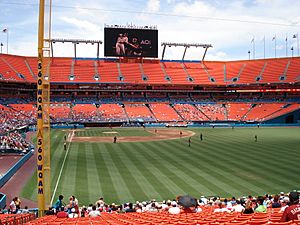
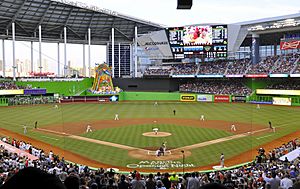
| Home Attendance at Hard Rock Stadium | ||||
|---|---|---|---|---|
| Year | Total Attendance | Game Average | League Rank | |
| 1993 | 3,064,847 | 37,838 | 7th | |
| 1994 | 1,937,467 | 33,695 | 9th | |
| 1995 | 1,700,466 | 23,950 | 13th | |
| 1996 | 1,746,767 | 21,565 | 18th | |
| 1997 | 2,364,387 | 29,190 | 11th | |
| 1998 | 1,730,384 | 21,363 | 22nd | |
| 1999 | 1,369,421 | 16,906 | 28th | |
| 2000 | 1,218,326 | 15,041 | 15th | |
| 2001 | 1,261,226 | 15,765 | 29th | |
| 2002 | 813,118 | 10,038 | 29th | |
| 2003 | 1,303,215 | 16,089 | 28th | |
| 2004 | 1,723,105 | 21,539 | 26th | |
| 2005 | 1,852,608 | 22,871 | 28th | |
| 2006 | 1,164,134 | 14,372 | 30th | |
| 2007 | 1,370,511 | 16,919 | 30th | |
| 2008 | 1,335,076 | 16,482 | 30th | |
| 2009 | 1,464,109 | 18,075 | 29th | |
| 2010 | 1,524,894 | 18,826 | 28th | |
| 2011 | 1,520,562 | 19,007 | 29th | |
| Home Attendance at LoanDepot Park | ||||
|---|---|---|---|---|
| Year | Total Attendance | Game Average | League Rank | |
| 2012 | 2,219,444 | 27,401 | 18th | |
| 2013 | 1,586,322 | 19,584 | 29th | |
| 2014 | 1,732,283 | 21,386 | 27th | |
| 2015 | 1,752,235 | 21,632 | 28th | |
| 2016 | 1,712,417 | 21,405 | 27th | |
| 2017 | 1,583,014 | 20,295 | 28th | |
| 2018 | 811,104 | 10,014 | 30th | |
Finance
Opening Day salaries
Opening Day payrolls for 25-man roster (since 1993):
| Opening Day Salary | ||||
|---|---|---|---|---|
| Year | Salary | Major League Rank | ||
| 1993 | $18,196,545 | 25th (of 28) | ||
| 1994 | $20,275,500 | 25th | ||
| 1995 | $23,670,000 | 25th | ||
| 1996 | $30,079,500 | 15th | ||
| 1997 | $47,753,000 | 7th | ||
| 1998 | $41,864,667 | 20th (of 30) | ||
| 1999 | $32,360,000 | 28th | ||
| 2000 | $19,900,000 | 29th | ||
| 2001 | $35,762,500 | 26th | ||
| 2002 | $41,979,917 | 25th | ||
| 2003 | $45,050,000 | 25th | ||
| 2004 | $42,143,042 | 25th | ||
| 2005 | $60,408,834 | 19th | ||
| 2006 | $14,998,500 | 30th | ||
| 2007 | $30,507,000 | 29th | ||
| 2008 | $21,811,500 | 30th | ||
| 2009 | $36,834,000 | 30th | ||
| 2010 | $47,429,719 | 26th | ||
| 2011 | $57,695,000 | 24th | ||
| 2012 | $118,078,000 | 7th | ||
| 2013 | $39,621,900 | 29th | ||
| 2014 | $46,440,400 | 29th | ||
| 2015 | $67,479,000 | 30th | ||
| 2016 | $84,637,500 | 26th | ||
| 2017 | $115,406,101 | 20th | ||
| 2018 | $99,510,143 | 23rd | ||
| 2019 | $71,903,319 | 29th | ||
| 2020 | $41,560,815 | 27th | ||
| 2021 | $56,931,750 | 28th | ||
Annual financial records
The annual financial records of the Marlins according to Forbes since 2001.
| Annual Snapshot of Miami Marlins finance | ||||||
| Year | Franchise Value (millions) | Revenue (millions) | Operating Income (millions) | Player Expenses (millions) | Wins-to-player cost ratio | |
| 2001 | $128 | $67 | $7 | $34 | 161 | |
| 2002 | $137 | $81 | $1 | $46 | 137 | |
| 2003 | $136 | $76 | $ −14 | $53 | 134 | |
| 2004 | $172 | $101 | $ −12 | $66 | 162 | |
| 2005 | $206 | $103 | $3 | $58 | 131 | |
| 2006 | $226 | $119 | $ −12 | $91 | 91 | |
| 2007 | $244 | $122 | $43 | $31 | 255 | |
| 2008 | $256 | $128 | $36 | $44 | 182 | |
| 2009 | $277 | $139 | $44 | $45 | 227 | |
| 2010 | $317 | $144 | $46 | $48 | 219 | |
| 2011 | $360 | $143 | $20.2 | $58 | 167 | |
See also
 In Spanish: Miami Marlins para niños
In Spanish: Miami Marlins para niños


